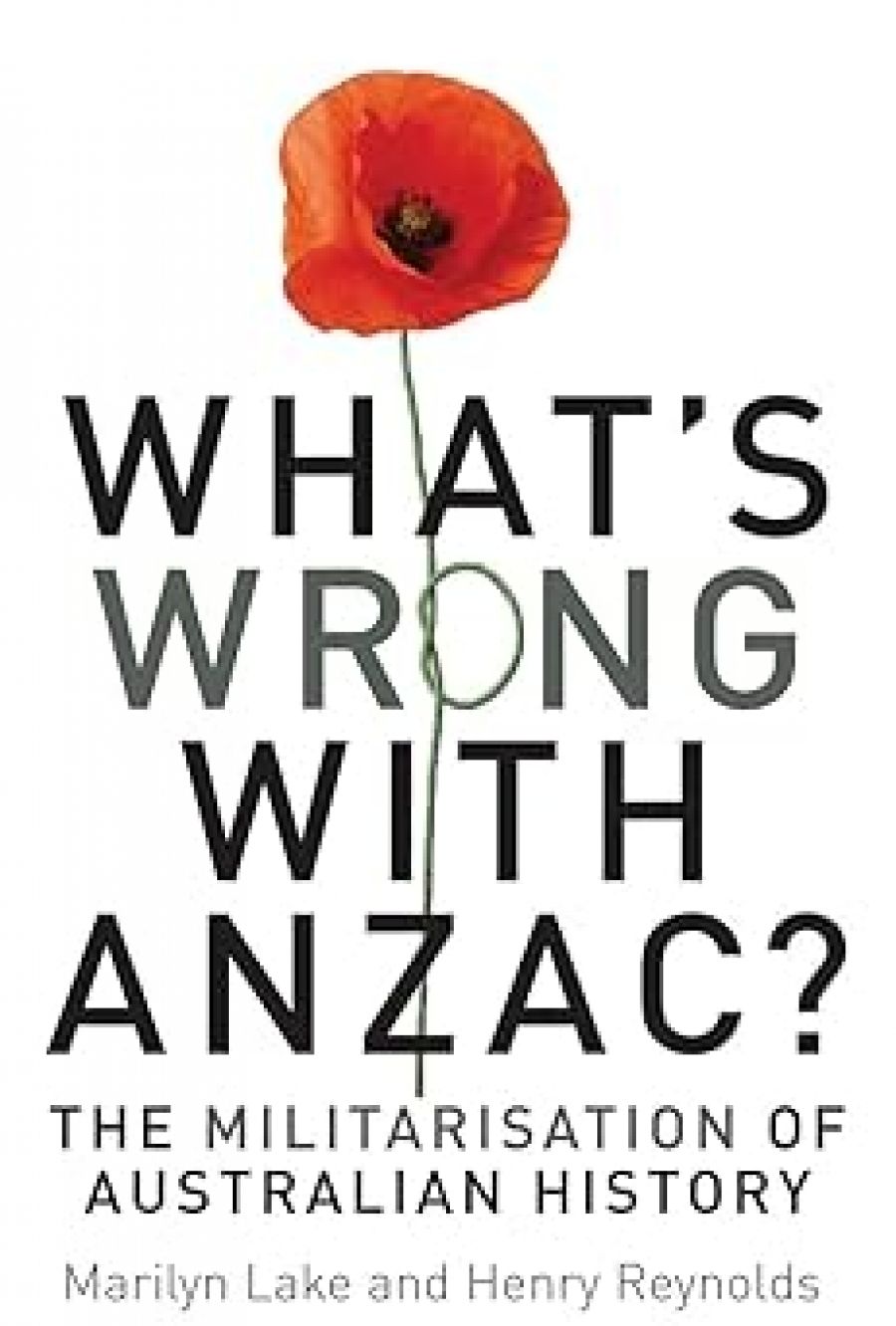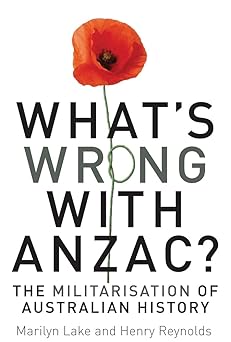
- Free Article: No
- Contents Category: Military History
- Review Article: Yes
- Article Title: Fighting on the beaches
- Article Subtitle: The battle for Australian history
- Online Only: No
- Custom Highlight Text:
This is an important book that should be read by as wide a range of historians as possible. Some will find it totally agreeable, others will find it very disagreeable, while others will agree with some parts of the book but not all. It is a book not just about the ‘militarisation of Australian history’, but, perhaps more importantly, about how Australians see themselves in the world.
- Book 1 Title: What’s wrong with Anzac? The militarisation of Australian history
- Book 1 Biblio: NewSouth Books, $29.95 pb, 191 pp
- Book 1 Cover Small (400 x 600):

There then follows a discussion of the wars in which Australia has been involved and whether we should have been involved in so many. Interwoven through this narrative are the authors’ views about whether nations require a war as a formative experience. In the case of Australia, the idea that we became a nation on the beaches of Gallipoli gets short shrift. As a consequence of these arguments, the authors conclude that all the wars in which we have participated, from South Africa to Afghanistan, have not been in our interest and have merely served to emphasise our subservience to imperial powers – first Great Britain, then the United States. Indeed, in recent times, Australia’s participation in war has been unhindered by the strong peace movements that played a greater role in our history in the twentieth century than they do now. Moreover, the emotionalism which surrounds Anzac Day in particular has deflected debate about the utility of the wars in which we have become embroiled and made criticism of those wars seem unpatriotic.
The emergence of Anzac Day as Australia’s ‘national day’ at the expense of 26 January is given a chapter of its own, and the increasing problems that seem to be associated with celebrating that day receive a thorough airing. Finally, in one of the most controversial chapters in the book, the Department of Veterans Affairs (DVA) and the Australian War Memorial (AWM) come in for heavy criticism for engaging in well-funded campaigns to place materials detailing the conventional Anzac story in schools in order to perpetuate the ‘Anzac ethos’. They conclude:
In the myth of Anzac, military achievements are exalted above civilian ones; events overseas are given priority over Australian developments; slow and patient nation-building is eclipsed by the bloody drama of battle; action is exalted over contemplation. The key premise of the Anzac legend is that nations and men are made in war. It is an idea that had currency a hundred years ago. Is it not now time for Australia to cast it aside?
I couldn’t agree more with these sentiments (and I am a military historian). Anzac Day is drowning in a sea of sentimental, uninformed comment, led by the essentially meaningless platitudes of various prime ministers, who often invoke what they call the Anzac spirit in the most inappropriate of circumstances. The popularisation of war has led to a plethora of books on military matters – mostly under-researched, badly constructed, huge in size, short on analysis – that add little to a deep understanding of our military past.
Meanwhile, it seems to me that many serious works of history on a diversity of subjects are going unpublished as some of our few remaining publishing houses engage in a race to the bottom to produce these desperately unwanted books of military history. This is not a blast against the whole field of military history; there is always room for books that enhance knowledge of our participation in war. It is just that we could well have done without a great deal that has been recently published in this area.
I am also in agreement with the authors’ rejection of the argument that some kind of blooding is necessary for virile nationhood to be reached. Surely in the case of Australia, this is demonstrable nonsense. The process of Federation was well thought out and reached its culmination in 1901. Australia emerged with its own democratic institutions and was fully established as a flourishing state for fifteen years prior to Gallipoli. The idea that some ‘blood sacrifice’ was needed in addition to this is almost obscene.
Moreover, our involvement in certain wars is open to question. In Vietnam we involved ourselves in what was essentially a civil war, to no good purpose. In Iraq it is possible to mount a case whereby we could be accused under Nuremberg law of waging aggressive war, an offence for which several Germans were hanged in 1946. As for Afghanistan, it is difficult to see at this point what might constitute a success. Do we really expect a democratic state to emerge? Only the most optimistic could say so.
Having made some strong statements in agreement with the authors, I am compelled to make some equally strong statements against them. In their survey of our military history, their views are made very plain. They see our country as Fortress Australia, largely unconcerned with what takes place beyond our shores, our defence forces required to deal only with violations of those shores. Australia, in this view, is a small world entire to itself that should not have been concerned about the many conflicts, some on the other side of the globe, with which we became embroiled through an imperial attachment to Britain or to an attachment to the Pax Americana.
I reject these views for a number of reasons. Firstly, I see Australia as a member of a larger entity conveniently called the West. The states that describe themselves as Western broadly adhere, however imperfectly, to the principles of the Enlightenment: secularism, tolerance and personal freedoms. There have always been perilously few such states in the world. Australia has always been one of them and therefore shares a common heritage with the others, and it is not in our interests to see any of them trampled over by states that do not share these values.
This is not pure idealism but idealism mixed with self-interest. If the states that constitute the West were snuffed out, we would find ourselves in a very hostile world indeed. Let me take the Great War as an example of this, because it is a conflict with which the authors seem to have a great deal of difficulty. It was caused not by ‘mistake’, as they seem to think, but by naked German aggression from a state that was anti-liberal, anti-democratic, militaristic and to some extent anti-Semitic. Its aims (pace Fritz Fischer) were the permanent domination of Western and Eastern Europe with the eventual subjugation of Britain and further expansion into the colonial world on its agenda. In other words, our protector (Britain) would be reduced to impotency. In what sense was this conflict none of our business? Whatever the authors think, if Germany had won it would have become our business sooner or later, but under much less favourable circumstances. Nor would a large peace movement have counted for much in German military calculations.
The other point to be made is that our participation in this war was not at all surprising, and was probably inevitable. According to the 1911 census, seventy-two per cent of all people living in Australia had been born in the United Kingdom. A majority of the remaining twenty-eight per cent had parents born in Britain. What could be more natural than to go to the aid, not only of our protector, but also of the country that most people could literally call ‘Home’? It is profoundly ahistorical to regard Australia then as it is now. Nor did the war itself divide Australian society, as the authors seem to imagine. There was no rioting in the streets in 1914, no demand on our government from a large peace movement that we not participate. The divisions came later over conscription – a very different matter from opposing the war.
Keeping to the theme of wars in which we ought not to have fought, there is an absence from this book that screams at me from every page. That absence is World War II. The only index entry of any substance is one which refers to rioting in the streets of Melbourne between American and Australian servicemen. While this was no doubt distressing for those few involved, it hardly deals with the central issue of that conflict. This was a war – as the authors surely know – against one of the foulest tyrannies ever to blacken the pages of history. Was it, too, none of our business? Were we not interested in the liberation of Belsen and Dachau and Changi and Auschwitz? Were we dupes of British or US imperialism to involve ourselves in these great causes? I would like the authors to expand their views on this war. Does it not fit their overall paradigm? Why is it largely absent from this book?
Finally, their description of the DVA and the AWM as propaganda machines surely overstates the case. Certainly, the DVA offers material to schools that might be described as following the party line. But schools and teachers are not obliged to teach it. As for the AWM, all I can say is that the director recently launched a book of mine that hardly took the party line on Gallipoli, and that I regularly attend conferences there where my papers – usually highly critical of the military – are not subjected to censorship. Surely it is part of the DVA’s and the AWM’s charter to disseminate information about Australia’s participation in war. If they follow one line, it is fortunate that because of our liberal democratic heritage, we can always find another.
My fundamental disagreement with sections of this book therefore amounts to this. The authors see in our Western heritage only danger – danger that we have been dragged into wars brought about by our great and powerful friends. This is certainly a danger and a reason why we should be discriminating about when we go to war and why. However, I see Australia as having been conferred immense advantages by being a part of the West: the rule of law, freedom of speech and assembly, parliamentary institutions and the freedom to publish books attacking a national institution. The world wars (other wars are more problematic) in which we have been involved were essentially battles for these freedoms, and our obligation and our self-interest demanded that we participate. We did so of our own free will and were not the simple dupes of imperialist propaganda that the authors seem to think we were.
This book ought to remind us that it is not war itself that defines our history. What defines us is our values. On occasion we have had to go to war to protect those values, but this should be no excuse for exalting the experience of fighting over the causes we fought for or over the many aspects of our history that we sought to protect.


Comments powered by CComment